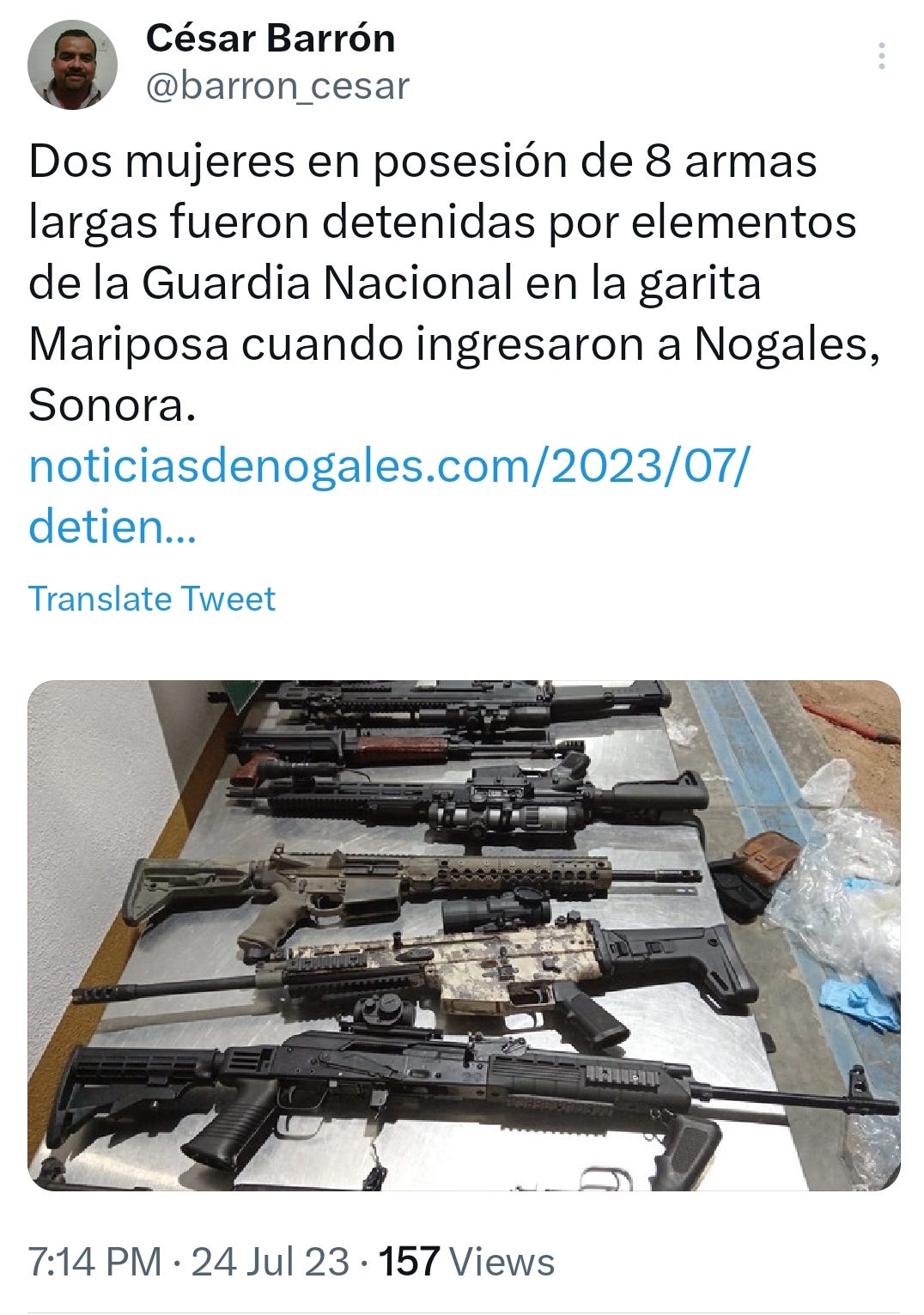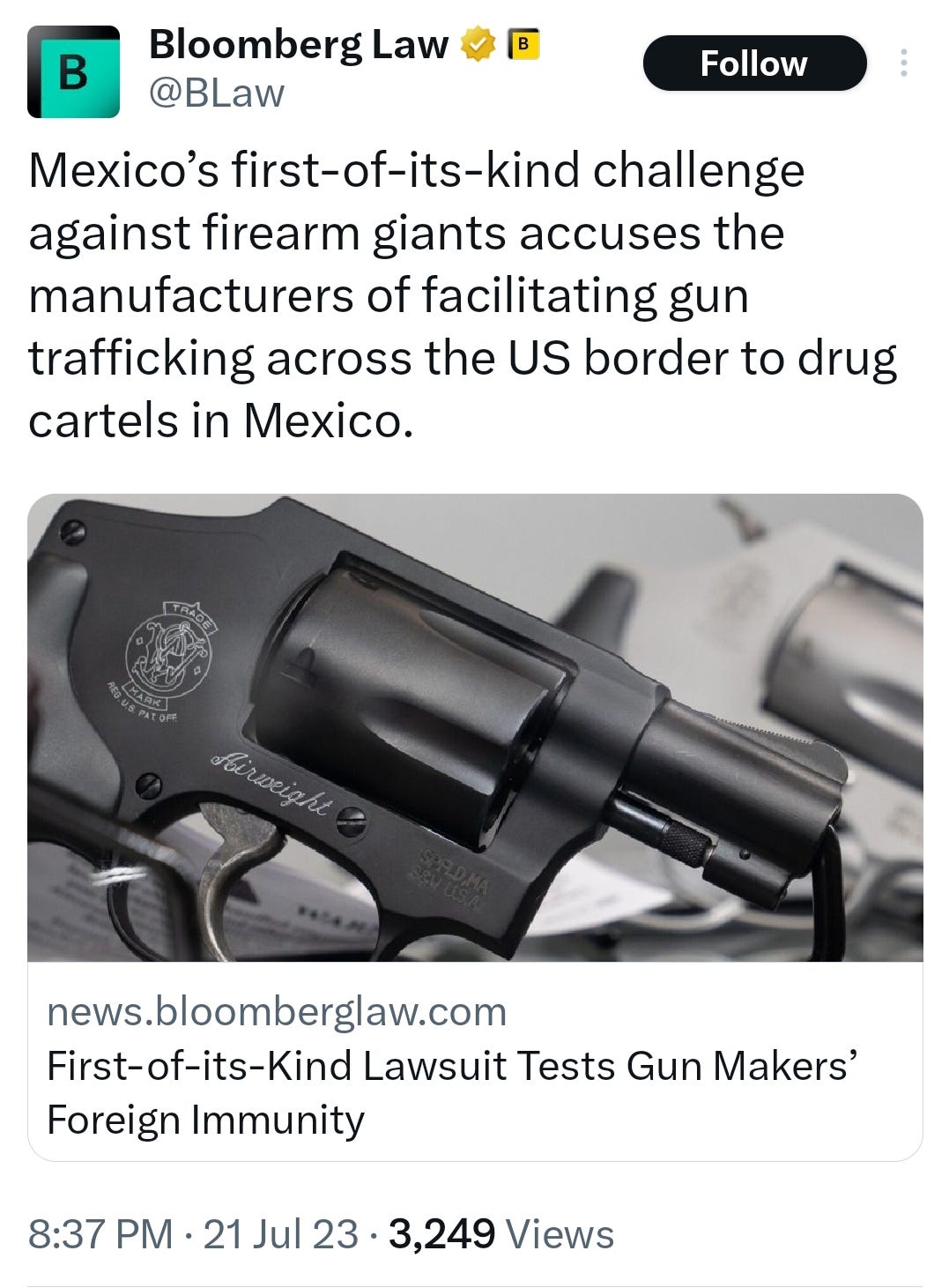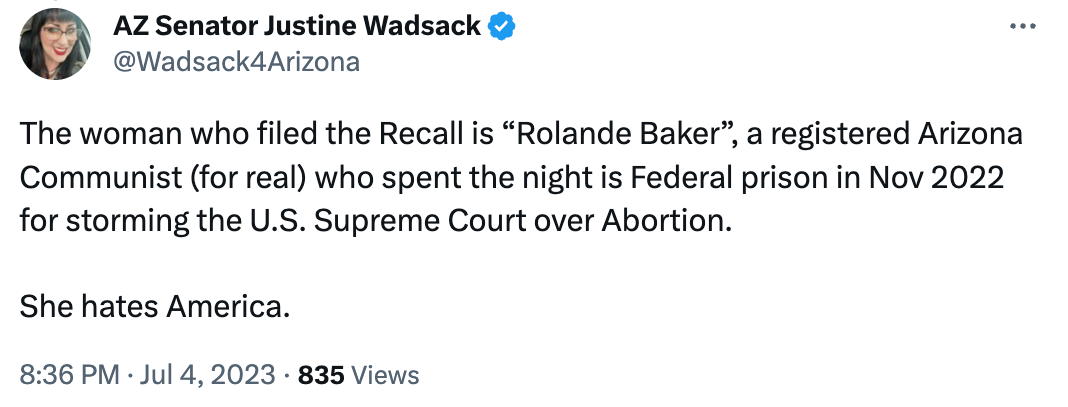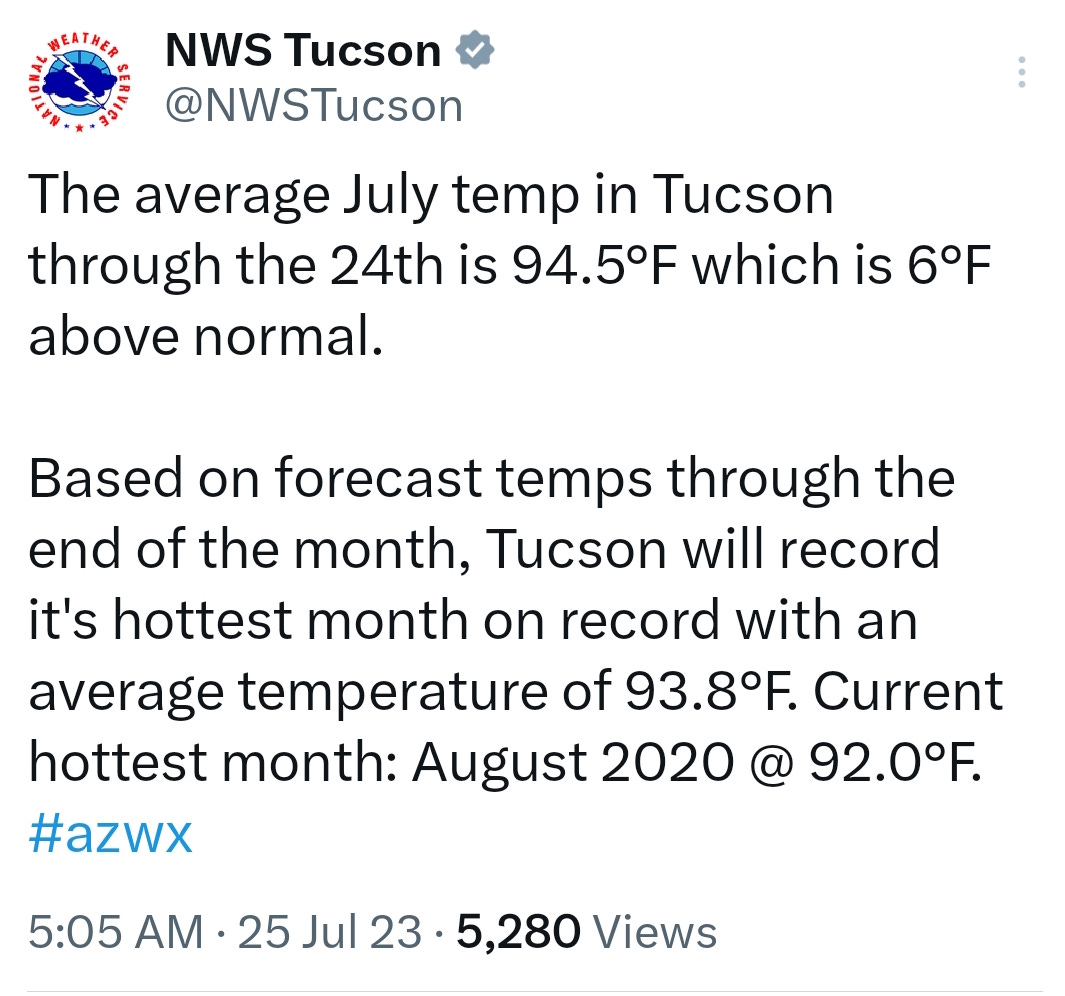The Daily Agenda: Mexico pushes gun smuggling into the light
Mexican officials have had it with U.S.-made firearms ... They're filing lawsuits and cutting deals ... Wadsack is coming for those recall supporters.
If a store in a border state sold huge quantities of firearms to a Mexican cartel and everybody knew they were doing it, should the firearms manufacturer be held responsible for supplying that store?
A federal appeals court judge in Boston posed that question to a lawyer representing firearms manufacturers this week. The lawyer answered, “that’s not enough” to hold them responsible.
Just like Twitter wasn’t held responsible for terrorists using the social media platform, manufacturers aren’t at fault for what a person does after they buy a firearm, the lawyer said.
The appeals court judge cast his question as a hypothetical, but what he was describing is exactly what happens every day in Arizona and other border states. Thousands of firearms are found at crime scenes in Mexico and traced back to U.S. stores each year.

It was a telling moment in a lawsuit that showed how much has changed on the firearms front, while basically staying the same. For the first time, firearms manufacturers had to address Mexican officials’ concerns in a courtroom. But it looks like federal law wasn’t designed to do anything about those concerns.
In a mirror image of how upset U.S. officials are about drugs coming from Mexico, Mexican officials are infuriated by the handguns, sniper rifles, machine guns, grenade launchers, and ammunition that come from the United States to arm criminal groups.
After trying, and failing, to get U.S. officials to do something about those weapons for many years, Mexican officials took an unprecedented step in 2021 when they sued the companies that made many of the firearms smuggled into Mexico.
A judge ruled against them in September, saying federal law clearly protected the companies from liability.
“While the court has considerable sympathy for the people of Mexico, and none whatsoever for those who traffic guns to Mexican criminal organizations, it is duty-bound to follow the law,” Chief Judge F Dennis Saylor said.
This week’s hearing in Boston was their final chance to convince the appeals court judges.
Although Mexican officials might not succeed in court, they did manage to force the issue into the light.
And they seem determined to keep it there. Just weeks after the judge ruled against them in September, they filed another lawsuit, this time against gun store owners in Tucson and other Arizona cities. They also put the issue before the Inter-American Court of Human Rights.
“With all these actions the Mexican Government is seeking to involve the actors that until now have not been involved in the fight against arms trafficking: the gun companies,” Mexican officials wrote in a March 15 news release.
They aren’t just sticking to the courtroom. Earlier this year, they made a deal with the Biden administration that boils down to “if the U.S. goes after guns, Mexico will go after fentanyl.”
And for the first time, the U.S. Congress is joining those efforts. At least a little bit. After the Uvalde shooting last year, Congress passed the Bipartisan Safer Communities Act, making it explicitly illegal to smuggle firearms out of the country for the first time ever.
Prosecutors now have a tool that fits the task, instead of having to depend on laws like “exporting goods without a license.” The new law already helped net the suspected head of what U.S. officials called a “prolific” gun-smuggling operation in Nogales, Sonora.
The exchange in the courtroom in Boston shows Mexican officials are forcing companies to answer uncomfortable questions. The answers to those questions speak volumes.
After the Boston lawsuit was filed, the National Shooting Sports Foundation, a firearms industry trade group, said in a statement to CNN:
“The Mexican government should focus on bringing the Mexican drug cartels to justice in Mexican courtrooms,” said NSSF Senior Vice President and General Counsel Lawrence G. Keane, “not filing a baseless lawsuit in an American court to deflect attention from its disgraceful and corrupt failure to protect its citizens.”
Maybe he has a point. That’s for the judges to decide. But it would be a lot easier for the Mexican government to bring those cartels to justice if they didn’t have to fight through a hail of gunfire every time they tried to do it.
Filling the void: Pima County supervisors voted Tuesday to appoint Betty Villegas as state Rep. Andrés Cano’s replacement in the Arizona Legislature. Villegas is director of South Tucson’s Housing and Development department and served as interim county supervisor following Richard Elías’ death in 2020, the Arizona Daily Star’s Nicole Ludden reports. She also ran an unsuccessful primary challenge against Democratic Sen. Sally Ann Gonzales in 2018. Villegas was approved by a vote of 3-1, with Supervisor Steve Christy voting against the appointment and Supervisor Sharon Bronson absent from the meeting. Villegas will finish out the remainder of Cano’s two-year term, which will end after the November 2024 election.
Taking to the airwaves: Pima County Board of Supervisors Chair Adelita Grijalva appeared on the Bill Buckmaster Show Monday, talking about mariachi, her recent bout of COVID, pygmy owls, the effect of the board’s recent decision to limit public comments and more. Grijalva told Buckmaster that during the July 11 supervisors meeting — the first since the new rule went into effect — call to the public was over in an hour.
“We want to make sure that public access continues, but when the bulk of your meeting is taken up by call to the audience and statements about ‘this is our time to rally our people that think like us,’ ... I’m hoping that has been toned down some,” Grijalva said.
Who’s driving this bus?: Officials with Sahuarita Unified and Continental Elementary school districts say that while they’ll have enough bus drivers to get students to and from school, but are still looking to hire more, the Green Valley News’ Jamie Verwys reports. Continental is four drivers short of their ideal number, but has substitutes ready to fill in as needed. Continental’s starting hourly pay for drivers of $14 per hour is less than other nearby districts, so officials are looking this year to compensate drivers in other ways.
“What we are trying this year — being a small school district we don't have the same options as larger districts with compensation — we’re trying to offer benefits ...for example, when you hit 30 hours a week you can earn health benefits,” said Continental Elementary School District Transportation Director Stephen Lane.
We want to pay Caitlin and Curt more than a part-time school bus driver makes, but we need your help to do that. If you’re enjoying the Tucson Agenda, why not upgrade to a paid subscription?
Leveling up: With less than a month remaining before classes begin at the University of Arizona, the school is adding several new safety features, according to KOLD’s Shelby Slaughter. The changes come nine months after the fatal shooting of hydrology professor Dr. Thomas Meixner. More than 700 new locks are being installed on classroom doors across campus, and new signs detailing safety measures are being installed in every building on campus. Chief Safety Officer Steven Patterson said he’s also working to make sure every building is only accessible with a CATCard, but that project is taking longer to finish and is about 75% complete.
No love lost: Efforts to recall Tucson freshman Republican Sen. Justine Wadsack are becoming contentious, according to the Arizona Mirror’s Jerod MacDonald-Evoy. Volunteers gathering signatures in support of the recall have been “combatively engaged” by Wadsack supporters and the senator has accused one critic of being a “stalker” and another a “registered communist.” Volunteers need to gather 30,981 signatures by Sept. 5 to trigger the recall. Meanwhile former lawmaker Frank Antenori penned an open letter to stick up for a Republican activist who questioned some of Wadsack’s votes. He accused the senator of getting her friends at the local GOP to launch a coordinated online bullying campaign that culminated in a resolution that Antenori said is clearly threatening to expel members for speaking against elected Republicans.
“A fragile snowflake of a State Senator, who seems incapable of receiving any kind of criticism without throwing a tantrum, has now weaponized the Pima County GOP to exact revenge on her perceived enemies,” Antenori wrote
She wants to hear from you: Arizona Attorney General Kris Mayes is hosting a listening session in Sierra Vista this afternoon, focusing on the proposed $25 billion merger between Albertsons and Kroger, the Tucson Sentinel’s Dylan Smith reports. The two-hour meeting begins at 1:30 p.m. at the Ethel Berger Center, 2950 East Tacoma Street. Attendees are asked to RSVP online. Mayes is looking into whether to attempt to block the merger, which would result in a single company controlling more than 5,000 stores across the country, making it the second-largest grocery operation after Walmart.
6: The number of degrees above average the temperature has been this July in Tucson.










Well done. Thanks especially for the firearms vs. fentanyl exposure.